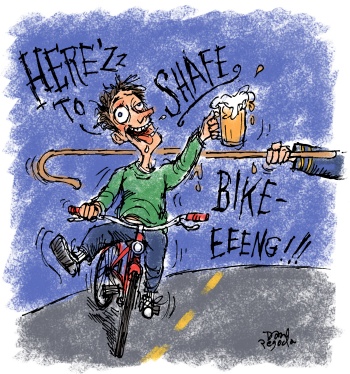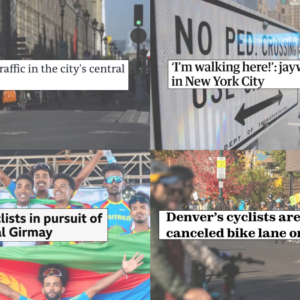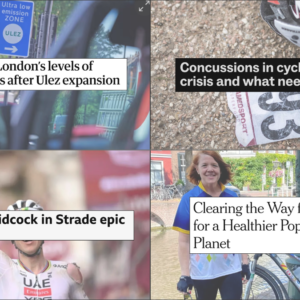Although it’s generally understood that it’s not cool to drink and drive, many people don’t think of cycling while in an altered state as being dangerous. But, before you over-indulge, here are some sobering statistics to consider…
According to NHTSA, (National Highway Transportation Safety Administration) 28% of all cyclists killed in 2009 had a measurable blood alcohol level. 24% of these had a BAC of .08% or higher. A bicyclist’s risk of a crash begins to increase significantly at 0.05% BAC and climbs rapidly after about 0.08%. In other words, when you’re a pint or two down the odds for a bicycle crash go up…sometimes way up. One study showed BAC over 0.10% increased injury risk tenfold.

It isn’t simply a matter of good sense to protect yourself (and others) from unnecessary and often self-inflicted harm, it’s expected of you. Did you know that when you travel on public right-of-way you have given your consent to field sobriety tests?
ORS 813.135 says,
“Any person who operates a vehicle upon premises open to the public or the highways of the state shall be deemed to have given consent to submit to field sobriety tests upon the request of a police officer for the purpose of determining if the person is under the influence of intoxicants…”
A bicycle operator, unlike someone driving a car, is not required to submit to a chemical test of their blood, breath or urine. However, failure or refusal to take the field sobriety tests is all that is needed for someone riding a bike to be arrested and charged with a DUII.
Speaking of DUII (driving under the influence of intoxicants), that infraction includes not just alcohol but any controlled substance (prescription drug) or inhalant. Here is the relevant Oregon statute:
813.010, Driving under the influence of intoxicants; penalty.
A person commits the offense of driving while under the influence of intoxicants if the person drives a vehicle while the person:
(a) Has 0.08 percent or more by weight of alcohol in the blood of the person as shown by chemical analysis of the breath or blood of the person made under ORS 813.100, 813.140 or 813.150; (not applicable to a bicyclist)
(b) Is under the influence of intoxicating liquor, a controlled substance or an inhalant; or
(c) Is under the influence of any combination of intoxicating liquor, an inhalant and a controlled substance.
A DUII is serious. It is not a traffic violation. It is a crime; a Class A Misdemeanor that comes with a $1,000 fine (not to mention additional court fees). If convicted, that crime becomes part of a personal record and cannot be expunged. It’s also possible that your driver’s license will be suspended (whether you have one or not. If not, you’d be having your eligibility to receive one suspended).
If charged with a DUII while riding a bicycle, you have two options: you can challenge it in court or you can opt for diversion. If eligible for diversion, you can admit guilt to the charge and enter a state program. Once completed, the criminal DUII charge and accompanying court penalties may be dropped.
But…
If your DUII offense involves a crash where someone other than yourself is physically injured or killed, diversion will not be an option.
If due to that same crash other charges are filed, diversion may get the DUII charge dropped but not the other charges.
If diversion is not completed or terminated by the court, the bicyclist will likely be convicted of the original DUII charge.
Once the diversion program has been completed, the DUII charge will be dropped but a permanent notation will be made on the driving record that the person went through a diversion program.
All in all, DUIIs are something you don’t want to tangle with.
Maturity and moderation are your best protections when it comes to altered states. Don’t ride and imbibe beyond your capacity for responsible and legal behavior.
Better yet, use mass transit or a designated biker (if you’re lucky enough to own a tandem or cargo bike!).
— Bike Law 101 appears twice a month thanks to the generous support of West End Bikes PDX (corner of 11th and SW Stark in downtown Portland). It’s written by Karen Lally and Kurt Jansen of the non-profit Animated Traffic Law Center based in Eugene, Oregon. For more info on bike law, browse the Bike Law 101 archives







Thanks for reading.
BikePortland has served this community with independent community journalism since 2005. We rely on subscriptions from readers like you to survive. Your financial support is vital in keeping this valuable resource alive and well.
Please subscribe today to strengthen and expand our work.
so wait, you’re saying that i can be drunk on a tandem bike as long as i’m not sitting in front?
“However, failure or refusal to take the field sobriety tests is all that is needed for someone riding a bike to be arrested and charged with a DUII.”
Is this correct? My understanding was that refusal to take a breathalyzer could be the basis for an administrative license suspension, but could not be used to create a presumption of intoxication under the criminal law.
John
It was my impression that you could refuse a field sobriety test, which is quite subjective, but not a breathalyzer.
Well, “field sobriety test” can mean just about anything, with varying levels of reliability, whereas a breathalyzer is a pretty specific test that works quite well.
Anyways, the distinction I’m making has to do with the difference between a civil or administrative process versus a criminal one. If you’re at risk of being charged with a crime, you are entitled to all the rights that our tattered and beaten Constitution still gives you, including the right to refuse to incriminate yourself by blowing into a straw.
However, as we were all reminded back when we studied our drivers pamphlet, driving is a privilege, not a right. The state can enforce a law requiring any driver on the road to consent to a breathalyzer. That’s because the penalty for refusing the breathalyzer is a license suspension, which is not a criminal penalty.
So that’s my basis for questioning the line I quoted: I do not believe it’s accurate to say that a refusal to take a breathalyzer is itself evidence that can be used to prosecute someone for a DUI.
-John
Actually, the field sobriety test is a set of 3 specific tests developed by NHTSA (walking in a straight line, moving your eyes back and forth, standing on one leg).
You can read more about the tests here: http://www.nhtsa.gov/People/injury/alcohol/SFST/appendix_a.htm.
It’s a very accurate test (~91%) and is widely used, moreso than the apocryphal tests like touching your nose with your eyes closed or saying the alphabet backwards.
Although this is BikePORTLAND, interestingly enough the law is very different right across the river in Washington. Operating a bicycle under the influence is entirely separate from the crime of operating a motor vehicle under the influence, as it should be given the typical potential results of each action. When BUII’ing, increased risk to others is still present, but significantly reduced. Further, although walking, bus or cab is the best option, if someone is going to drive or bike around drunk, which mode would you prefer they use???
exactly.
I would prefer the person be an adult and make a decision to not impact someone elses life just because they want to be trendy while drunk. If you pull you bike out into traffic going the wrong way drunk and someone hits you a car accidentally they will be emotionally scared for life. So catch a cab lock your bike and be kind to the universe in proper Portland Style!
“…Further, although walking, bus or cab is the best option, if someone is going to drive or bike around drunk, which mode would you prefer they use??? …” Schrauf
Is there some fundamental principle of American Constitutional Law, or Bill of Rights, that says people of this country are obliged to make their public roads available to people that desire to operate vehicles upon them while intoxicated?
Is there some over-riding reason, some kind of vital need, people of the USA should willingly allow drunks to operate vehicles on public roads and sidewalks, rather than, for example, having a sober person drive or bike them home, rather than the drunk operating the vehicle themselves?
I don’t think there is. Threat posed by drunken operation of vehicles goes on, not because it’s a safe and correct use of public roads, but because, due to limits on the availability of enforcement resources, it’s something people not willing to take full responsibility for their social conduct, have simply been able to get away with.
sorry,,, LOL ! way funny
I’m all for enforcement of Under the Influence laws for all road users.
Unlike the stumbling blind drunk that wanders out in traffic over and over the smashed cyclist should be a self-solving problem, at least for 2 wheeled cycles.
PS: like this cartoonist too.
Not to go off a tangent too much, but I am amazed how many people I see biking and talking on a cell phone. Not hands free, cell phone in hand to ear and riding.
Most recently someone on a cell phone riding all the way across (eastbound) the broadway bridge and through one of the most dangerous set of intersections in Portland to get to Williams during rush hour.
Probably worse than being intoxicated in my book. May have been intoxicated too? Who knows.
Is it illegal to ride a bicycle and talk on a cellphone? I thought the law says “Motor Vehicle” specifically in the Cell Phone Law.
Cycling death statistics seem a notch safer considering that a third of all cycling deaths are self alcohol related. A significant part the rest are likely related to drivers’ DUI.
First Idaho, now Washington. Our neighbors have better laws than us.
A drunk stoker on a tandem would still be operating a vehicle under the influence.
ok, so ORS 813.135 says that anybody operating a vehicle in public has to take a sobriety test… it then refers to ORS 813.136 for the penalty…
says the refusal is admissible for anything that comes up because of it, while driving…
…
so it seems that a cyclist could refuse the field sobriety test, then not be subjected to the ORS 813.010 chemical tests, and not be held accountable because they’re not “driving”…
granted, they will likely try to pull precedence on you…
Now if they could just have Tri-Met running long enough to actually catch one after bar closing, a few lives might be saved, but oh well. Don’t want pesky drunks on public conveyances. They might barf instead of run someone over.
Only problem with that is the additional cost to everyone else. Are you willing to pay the additional money so that drunks can have a safe means home? As long as their are taxi services which are still running when the bars close, I’m not.
make the bar owners pay for the taxis
Why? This makes no sense. How about the consumer acts responsibly and drinks an appropriate amount?
Why do so many in the US think it is appropriate for the masses to pay for the mistakes and inabilities of the few?
This embodies the major fail of all “legislation over reality” approaches to local politics. You can claim that lack of access to safe routes home will discourage drinking and driving, but the only ACTUAL way to discourage drinking and driving is to give ample access to safe alternatives home. Extend Trimet service to 2:30? Drinking-related car collisions between 12:30 AM and 3 AM will decline. Moralize about taxes and how it’s not our job to help the drunks be safe? Accept the collateral damage of said 12:30AM-3AM collisions.
Suck it up. Encourage Trimet to run during all drinking hours, all the time.
Wow, those look like pretty serious penalties…until you remember how many motorists on the road have multiple DUII convictions, and may have had their driving privileges suspended.
Washington DUI NOT Applicable to Cyclists http://www.usroads.com/journals/p/rilj/9801/ri980102.htm
So the numbers say that of those killed, 72% didn’t have any measurable amount of alcohol in their blood, and, from the ones that had some, 76% didn’t have even 0.08% BAC. It seems way more dangerous to be sober.
Aside from that, these numbers don’t say much – if someone collected the data of, say, amount of hair someone had on their body, that wouldn’t necessarily mean that the hair or lack of it had anything to do with the cause of crashes.
~~~~~~
Any law made for motor vehicles that simply “stretch” to be made apliable to bikes is just plain stupid.
If there had been numerous studies linking body hair to impaired judgement/motor skills and delayed reaction times, then one could argue that crashes are linked to the amount of body hair. Seems like that would be a logical step.
Of course using your argument, one could say it is more dangerous to drive sober than it is to drive drunk – providing that most automobile deaths occur with those that are sober. And commercial pilots should be allowed to drink as well, unless statistics can prove that most airline fatalities occur due to intoxicated pilots.
Disputing a law merely because it originated for motor vehicles is just plain stupid.
Yes, indeed. If also there were studies linking the crashes with the fatalities. As far as I know, most of the data shows that fatalities are linked to the presence of a car or truck. Being impaired or having delayed reactions should not be illegal unless your actions at the moment are inherently dangerous to others. Such as driving or piloting an airplane. If so, it would be illegal to be a toddler, a senior citizen, or mentally disabled.
And I have to strongly disagree with you saying disputing a law merely because it originated for motor vehicles is stupid. I believe that common sense should come before law, and, aside from having wheels and being mode of transportation, motor vehicles and human powered ones have almost nothing in common. We have granted way more freedom and space to the use of those big machinery, that the least we could do is come up with some regulation as to how their users interact with living beings and each other. Bicycles and pedestrians are part of a very different realm, and, if the necessity comes from within to regulate behavior through laws, then they should be created based on those needs.
“… aside from having wheels and being mode of transportation, motor vehicles and human powered ones have almost nothing in common. …” Tiago DeJerk
A car colliding with a pedestrian can hurt or kill that pedestrian. A bike colliding and with a pedestrian can hurt or kill a pedestrian. That seems to be something significant both modes of travel have in common.
If the public is prepared to excuse use of bikes by DUI convicted people on the basis of a relatively less degree of injury or death to pedestrians that bikes as a mode of transportation used by DUI people tend to result in…that’s a different story.
If people driving and walking don’t mind drunks riding bikes on the road, and being subject to the associated risks, then…no problem. Let them ride. Let them get as stupidly drunk in their car as they want to, which some may very well do, knowing that ‘Hey…no biggy. If they take away my driver’s license, I’ll just ride around one of those electric bikes for awhile. Maybe being drunk on a bike will be fun.’.
Aside from the bizarre and random occasions, these collisions never happen.
I’ve seen people ride their bikes on ways that I thought weren’t great, and usually it was because they were novice – should they also be denied access to the road?
And as far as I know, drinking is not a crime. Walking under the influence is not a crime, either, nor is taking the bus. Why should bike be? Give me consistent data, examples showing that people riding their bikes drunk are a bigger liability than drunk walkers.
I would love to see people convicted of DIY switching to bicycles.
“Bicycles and pedestrians are part of a very different realm, and, if the necessity comes from within to regulate behavior through laws, then they should be created based on those needs.”
The reality is that these realms overlap, independent as they may be. Bicycles are commonly operated on public roads with all sorts of other modes of transportation around them (cyclists, walkers, drivers etc.).
“Being impaired or having delayed reactions should not be illegal unless your actions at the moment are inherently dangerous to others.”
You can say that the inebriated cyclist is only a danger to themselves, but surely you can’t believe that every crash involves only the cyclist. Is it really that hard to believe that a drunk rider might run into a sober cyclist/walker/driver? Is it excuseable because (s)he was on a bike? Should the sober victim be burdened with the cost(s) of repair or healing because the perpetrator was human powered?
“As far as I know, most of the data shows that fatalities are linked to the presence of a car or truck.”
So what if it does? All that implies is that the victim (occupant of the vehicle) probably wasn’t physically injured when the impaired cyclist ran into them. Of course there is the emotional damage of having witnessed a death and the financial burden that may accompany the non-accident. Not to mention that if the victim wasn’t in the vehicle and the cyclist hit them, the victim could suffer even more physical damage.
I’m pretty sure that there are studies linking use of alcohol, crashes and fatalities.
i gotta echo what skid said. show me the problem before you defend the law.
Your not considering there to be a problem with people riding bikes while drunk doesn’t mean there isn’t such a problem. If you’re not personally having a problem with people being drunk on bikes, I’m glad for you. The point is, other people are having problems with drunk people operating vehicles on the road.
They don’t like the thought of being crashed into by a drunk on a bike any more than they do a drunk driving a car. They don’t consider that an intoxicated person’s use of the road to operate a vehicle is a legitimate one. If you can figure out a solid argument in favor of allowing drunks the right to ride bikes on public roads and sidewalks, you may have a good start to repealing ‘biking under the influence’ laws. Good luck.
I am probably being too candid but there are a lot of people riding bikes home after the bars let out. Where are all the fatalities?
Do you need fatalities to make a persuasive argument that a particularly irresponsible use of public roads shouldn’t be allowed. How about Eric Davidson? Remember him? Still alive but while riding very drunk, injured severely, perhaps in part because his reflexes were impaired to the extent he could not react in time to stop from being run down by the drunk driver exiting the Safeway parking lot.
After the bars close, when the streets are relatively less busy than earlier hours of the day, is not the only time of the day when problem drinkers imbibe. Except when they’re sleeping, some of them drink during many, if not all hours of the day. Concerns expressed by all types of road users, about close calls with cyclist, are common. How many of those close calls have to do with the cyclist being drunk, because the person riding drunk knows they’ve got a better chance of evading the law being drunk on a bike than they do being drunk behind the wheel of a car?
Personally, but I don’t by any means think I’m alone on this…I don’t need BUI caused fatalities, or stats indicating a rate of such fatalities, to make a strong case that people should not be biking on the road while drunk. No pedestrian or road user should have to bear the burden of risk posed by drunks operating vehicles of any kind on the road, for lack of laws and enforcement that make it very clear this isn’t an acceptable use of the public’s roads.
yes, you are not alone on this one. the world is full of moralists that want to impose their own values into others. that’s why marijuana is still illegal. that’s why gay people can’t get married.
This is an issue of a right to public safety, not morality. It’s the idea that people have a right to be able to use the road without being endangered by drunks operating vehicles. If you want to drink alcohol or otherwise be under the influence of intoxicants to excess, fine…but don’t feel entitled to operate any vehicle on the road while you’re drunk or stoned.
Wait. So I have a 72% of dying while riding sober but only a 28% chance of dying while under the influence? 😉 😉
beercycling?
If you find yourself drunk and facing a long bike ride home there is always AAA. Simply take all the air out of your tires and call for a free tow home on your bike.
It is embarrassing, because an actual tow truck comes to get you. But you won’t mind as much because you are drunk.
They also get there faster than most cabs in Portland are able to on busy weekend nights.
[Note: We have the platinum AAA membership – not sure if this works for the lower level plans.]
The legality of biking UI is obviously not clear, but the safety is. I find the Ohio case statement about bicyclists rarely, if ever, causing harm to others to be untrue, if expanding harm to more than physical harm. If some drunk bicyclist makes a poor decision and a motor vehiclist hits that biker, the vehicle driver is in for time spent dealing with the situation, possible court/lawyer time, possible dealing with insurance, possible “mental anguish” – I’m sure that scene would replay in my head for years. These are all harm.